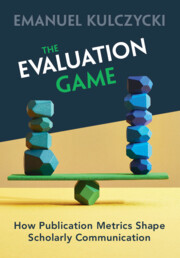Book contents
- The Evaluation Game
- The Evaluation Game
- Copyright page
- Contents
- Acknowledgments
- Introduction
- 1 Evaluation as Power
- 2 Economization and Metricization
- 3 Untold Histories of Research Evaluation
- 4 The Diversity of Evaluative Powers
- 5 Players and the Stakes
- 6 Playing the Evaluation Game
- Conclusions
- References
- Index
2 - Economization and Metricization
Published online by Cambridge University Press: 21 April 2023
- The Evaluation Game
- The Evaluation Game
- Copyright page
- Contents
- Acknowledgments
- Introduction
- 1 Evaluation as Power
- 2 Economization and Metricization
- 3 Untold Histories of Research Evaluation
- 4 The Diversity of Evaluative Powers
- 5 Players and the Stakes
- 6 Playing the Evaluation Game
- Conclusions
- References
- Index
Summary
Chapter 2 is dedicated to a discussion of the conditions which enabled the emergence of research evaluation systems. Beyond the general phenomena that characterize modern society, such as rationalization, capitalism, or bureaucratization, there are also other elements that should be included as constitutive conditions for evaluative power. The chapter goes on to provide a systematic account of economization and metricization. It argues that these are the two main forces that shape contemporary academia, having enabled the emergence of research evaluation systems. Economization is defined as promoting the idea that science’s economic inputs and products should be utilized for bolstering the economy, while metricization reduces every aspect of science and social life to metrics. The varied impacts of these two forces are described by means of an expansive account of the social processes, values, logics, and technologies of power that undergird today’s research evaluation systems. This chapter therefore lays the foundations for one of the book’s key claims. This is that metrics should be understood as merely a symptom rather than the cause of the difficulties confronting academia today.
Keywords
Information
- Type
- Chapter
- Information
- The Evaluation GameHow Publication Metrics Shape Scholarly Communication, pp. 47 - 69Publisher: Cambridge University PressPrint publication year: 2023
